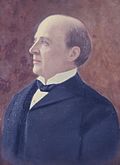| | |||||||||||||||||||||
| |||||||||||||||||||||
| |||||||||||||||||||||
 County results Harrison: 40–50% 50–60% 60–70% 70–80% 80–90% Vardaman: 40–50% 50–60% 60-70% 70-80% Noel: 50-60% | |||||||||||||||||||||
| |||||||||||||||||||||
| Elections in Mississippi |
|---|
 |
The 1918 United States Senate election in Mississippi was held on November 3, 1918. Incumbent Democratic U.S. Senator James K. Vardaman ran for re-election to a second term in office, but was defeated in the Democratic primary by U.S. Representative Pat Harrison.
Contents
- Background
- Democratic primary
- Candidates
- Campaign
- Results
- General election
- Results 2
- See also
- References
- Further reading
Because Harrison faced only nominal opposition in the general election, his victory in the August 20 primary was tantamount to election.


